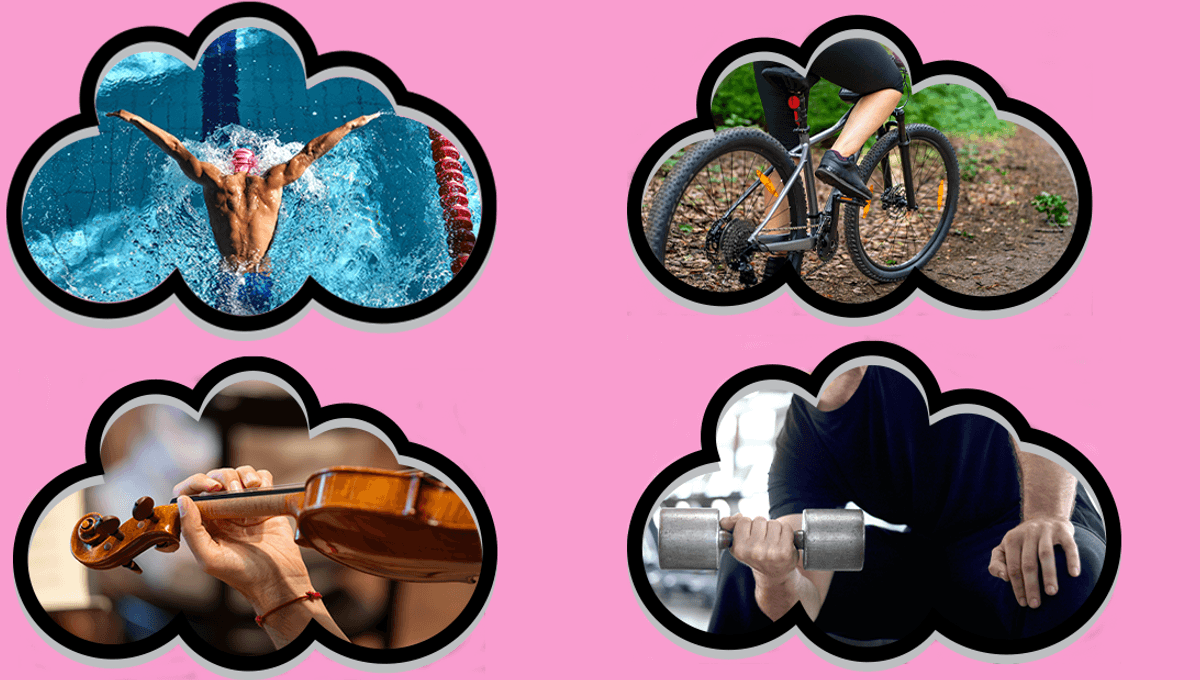
When we jump on a bike after not riding for years, or somehow manage to pick out a tune on the piano despite not having lessons since we were kids, we might put that down to “muscle memory” – but is that really what we mean? It seems we may be confusing ourselves by using this common expression to refer to two very different biological phenomena, so let’s bring some clarity to proceedings.
“It’s like riding a bike”
The two scenarios above, as well as a host of other daily actions we barely even stop to think about, are actually examples of motor memory.
In the process of learning how to perform an action involving movement, like the classic examples of riding a bike, skating, or swimming, the necessary coordination to do it successfully is encoded within the brain. That means that even after a break, it’s quite easy for us to tap into those saved “files” again and remember how to do the task, even subconsciously.
Back in 1967, psychologists Paul Fitts and Michael Posner laid out a theory in which motor learning was divided into three phases: a cognitive phase, an associative phase, and an autonomous phase. As we learn a new skill, we move through the phases – at first we have to think hard about the movements we’re making, but gradually they become automatic.
More recently, researchers have used sophisticated imaging to watch the multiple stages of motor learning as they happen in the brain. Different regions of the brain are employed at different times until the skill is fully embedded.
The fact that memories acquired in this way seem to persist so well, even in cases where other memories have been irreparably damaged, has sparked a lot of scientific curiosity.
“Some studies on Alzheimer’s disease include participants who were previously musicians and couldn’t remember their own families, but they could still play beautiful music,” said associate professor of neurosurgery and neurology Jun Ding in a Stanford University blog post. “Clearly, there’s a huge difference in the way that motor memories are formed.”
Ding was part of a team that investigated this difference. In a 2022 study, they found that mice learning to fetch food pellets formed new neural connections simultaneously in two parts of the brain: the motor cortex and the dorsolateral striatum, which is involved in the formation of habitual behaviors.
Weeks later, when the mice were tested on what they’d learned, their brains showed a spike in activity in those same neural networks. They speculated that over time, as we repeat an action, we develop redundant neural pathways that can control it – meaning that if one is blocked or damaged, there’s another there to take its place. This could explain why motor memory seems to last as long as it does.
Structural changes in the brain can also be seen. As explained in a 2017 post by then University of Oxford DPhil candidate Ainslie Johnstone, we know that representations of different muscle areas in the body change in the brain to reflect repetitive actions – if you’re a professional violinist, the part of your cortex dedicated to your left hand, which has to do the majority of the complex and intricate movements, will be bigger than average.
All this to say, motor memory is very much a brain-centric process – your muscles have comparatively little to do with it. If that’s not muscle memory, then what is?
Is “muscle memory” actually a thing?
When fitness professionals talk about muscle memory, they generally mean the capacity of our muscles to “remember” previous training we’ve undertaken.
During muscle-building training, the body physically adds new cells to the muscles that are being targeted. It was previously assumed that these cells would be lost if the newly acquired muscle mass was not maintained through continued exercise. However, a 2019 review put paid to this idea.
Lawrence M. Schwartz, a professor at the University of Massachusetts Amherst, took a look at the accumulated data on this topic and concluded that “the apoptotic loss of nuclei with atrophy cannot be supported”. In other words, even when a muscle starts to wither, that doesn’t mean the cells are actually dying.
What’s more, trainers have observed that you can regain that lost muscle surprisingly quickly. Nick Mitchell, the founder and CEO of personal training company Ultimate Performance, told CNN that regaining lost muscle mass often happens more speedily than gaining it in the first place. The longer you’ve had the muscle, the slower it is to disappear and the quicker it is to get it back.
“Once you’ve got those additional nuclei, they’re in reserve. You’re banking that capacity,” Schwartz told The Washington Post.
In a way, then, the muscles remember what it was like to be big and beefy – possibly permanently, according to some research – allowing them to more easily return to that form. You might even say that, for them, it’s just like riding a bike.
All “explainer” articles are confirmed by fact checkers to be correct at time of publishing. Text, images, and links may be edited, removed, or added to at a later date to keep information current.
Source Link: What Actually Is Muscle Memory?